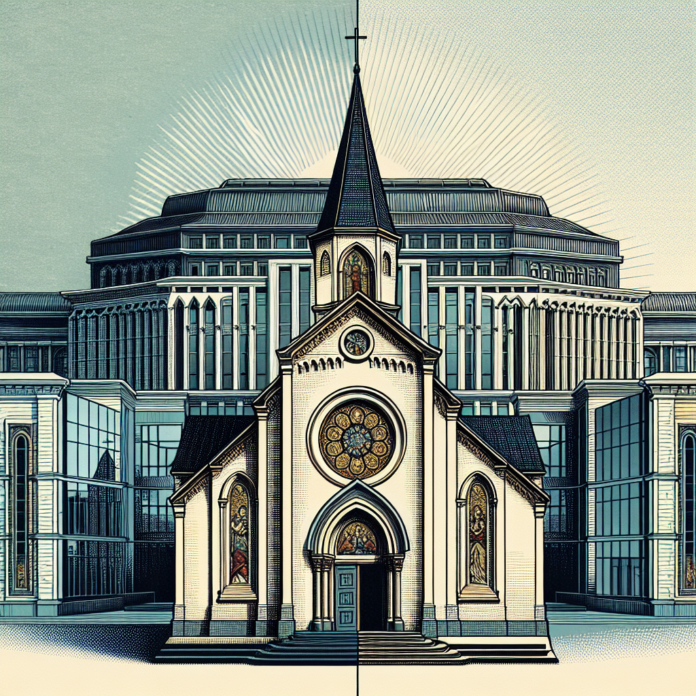Faith-Based Interference: Why the Catholic Church Should Stay Out of Politics
In an evolving world increasingly defined by plurality and progressiveness, the role of religious institutions in shaping political agendas continues to be a contentious issue. This friction is particularly salient when considering the influence of the Catholic Church in political spheres. The Catholic Church’s continued foray into politics, often championed by its conservative factions, runs the risk of hindering societal change and disrupting the progress necessary in an ever-diversifying global landscape.
Historical Context of Catholic Interference
The Catholic Church’s entanglement in political affairs is not a new phenomenon. In medieval Europe, the Church wielded considerable power, often eclipsing the authority of monarchs and emperors. Through mechanisms like the Papal States and the Holy Roman Empire, the Church’s influence permeated governmental decisions, war strategies, and even tax policies. Notably, in the 16th century, the Protestant Reformation emerged partly in response to the Church’s overreach into political realms, illustrating that the tension between faith and politics is a long-standing one.
As centuries passed, the Church grappled with the necessity of adapting to modernity. The Second Vatican Council (1962-1965), convened by Pope John XXIII, marked a significant effort to modernize the Church. This council sought to open dialogues with contemporary society, advocate for religious freedoms, and encourage lay participation in the Church. However, the conflicts between traditionalists and progressives within the Catholic hierarchy persisted. Traditionalists clung to the church’s perceived glory days, while progressives sought alignment with the values of the modern world.
The Rise of Catholic Conservatism
In recent decades, Catholic conservatism has gained significant traction, substantially impacting political discourses, particularly in the United States. Groups such as Opus Dei and the Society of St. Pius X represent the embodiment of traditionalist values—adamant in their resistance to progressive change, including on issues such as LGBTQ rights, reproductive health, and gender equality. These groups often promote the Latin Mass, not merely as a preferred mode of worship but as a symbol of their resistance to modernizing influences within both the Church and society at large.
The Latin Mass, reinstated to official status by Pope Benedict XVI, is venerated by many conservatives for its perceived purity and alignment with the original doctrines of Catholicism. However, its popularity among traditionalist factions often underscores a resistance to the inclusivity and aggiornamento (updating) encouraged by the Second Vatican Council. By clinging to archaic liturgical practices, the conservatives inadvertently signal their opposition to any reinterpretation of Church doctrine that aligns with contemporary human rights perspectives.
The Progressive Papacy of Pope Francis
Under the leadership of Pope Francis, the Catholic Church has experienced a wave of progressive change, much to the disdain of conservative factions within the institution. Francis has reemphasized themes of inclusivity, compassion, and social justice, aligning the Church’s mission with the global challenges of poverty, climate change, and human rights. By washing the feet of women and non-Christians, criticizing capitalist excesses, and advocating for the marginalized, Francis has sparked hope among progressive Catholics and observers worldwide.
Critics from conservative circles argue that Pope Francis’s reforms destabilize the Church’s foundational pillars. They reference a drift towards moral relativism and a dilution of core Catholic tenets. Nonetheless, these critiques often omit the transformative potential of a Church that evolves with the times. Progressives argue that Pope Francis’s reforms align more closely with the foundational Christian ethos of universal love and empathy, explicitly rooted in the teachings of Jesus Christ.
The Detriments of Religious Political Interference
Beyond internal Church dynamics, the repercussions of Catholic conservatism are profoundly felt in political arenas. Issues such as reproductive rights and LGBTQ rights find themselves continuously under siege as traditionalists deploy their considerable political lobbying power to block progressive legislation. For instance, in countries like Poland and Ireland, stringent anti-abortion laws have been upheld due to the Church’s potent political leverage, often at the expense of women’s autonomy and health.
In the United States, the entanglement of religion and politics manifests through an unwavering alliance between conservative Catholics and right-wing political movements. This alliance has influenced significant political appointments, most notably in the judiciary, where Supreme Court justices with conservative Catholic backgrounds have consistently ruled in ways that align with the Church’s traditionalist views, impacting the lives of millions. This infringement essentially subverts the democratic principle of separation between Church and state, delineated by the U.S. Constitution.
Towards a Secular Democracy
As societies progress, the imperative for a clear demarcation between religious influence and political governance becomes increasingly apparent. A modern democracy thrives on principles of inclusivity, equality, and human rights—values that are often stifled by conservative religious dogma. While the Catholic Church, like any other organization, has the right to hold and express its views, the undue influence in political matters is detrimental to the fabric of a pluralistic society.
Pope Francis’s vision of a more inclusive, compassionate Church stands as a beacon in these tumultuous times. His papacy exemplifies that religious institutions do not have to hinder progress but can evolve alongside it, fostering environments where faith and modernity coexist harmoniously. By relegating its political aspirations and focusing on spiritual and humanitarian missions, the Catholic Church has the potential to contribute positively to the world’s future rather than anchoring it to its past.
Conclusion
The Catholic Church’s historical and current involvement in politics, spearheaded by its conservative factions, poses significant impediments to progressive societal development. While tradition holds value, clinging to outdated dogmas and exerting undue political influence runs counter to the principles of modern democracy. Embracing Pope Francis’s progressive ethos offers a pathway towards a more inclusive, equitable future where faith complements, rather than obstructs, societal evolution. Ultimately, it is in the disengagement from direct political influence where the Catholic Church can reclaim its true spiritual and moral leadership, guiding humanity towards compassion, unity, and understanding.
